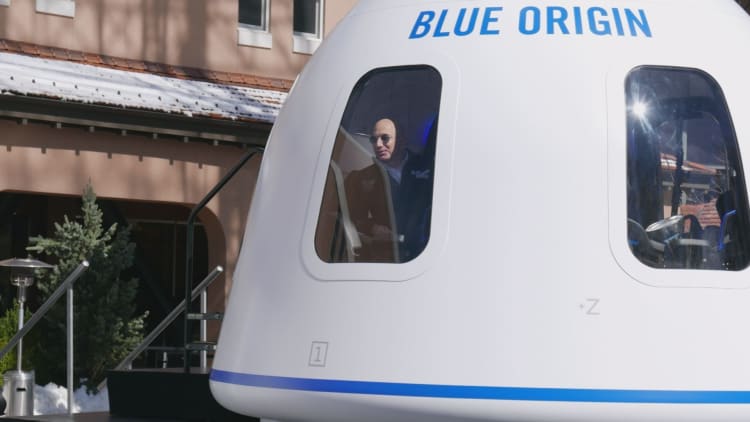
Jeff Bezos wants to see the space industry expand to the scale of today's internet industry, creating a "completely new world."
And he's spending quite a bit to make it happen.
The Amazon founder and CEO also founded Blue Origin, a reusable rocket company that builds on Bezos' childhood dreams of space colonization. While the company will one day be a "thriving enterprise," Bezos joked it's going to be a long road. One of the company's rockets, New Glenn, will cost at least $2.5 billion, Bezos said.
"My business model right now for Blue Origin is I sell about $1 billion a year of Amazon stock and use it to invest in Blue Origin," Bezos said.
Bezos appeared on Wednesday at the 33rd Space Symposium in Colorado Springs, where he said he would reveal more details on a rocket his start-up hopes will take paying customers to space by 2018.
He said he'll apply some of the lessons he learned at Amazon, especially when it comes to bringing down costs and gauging customer demand.
"Of course, we'll be just as competitive," Bezos said. "But how do you compete? When people say that an entrant is disruptive in an industry, what they really mean is that customers are adopting that new way. At Amazon we've had a lot of inventions that we were very excited about and customers didn't care at all. And believe me, those inventions were not disruptive in any way. The only thing that's disruptive is customer adoption. If you can invent a better way, and customers believe that's a better way, then they will use it. And that's what we're trying to do at Blue Origin."
Start-ups like Blue Origin and Elon Musk's SpaceX have joined more traditional companies in the space race in recent years. But despite his competitive spirit, Bezos said he's not thinking it of a sprint to the finish line.
"I always remind the team is that we are not racing," Bezos said. "We are going to test it. We will put humans on this when it is ready and not a second sooner...It's a mistake to race to a deadline when you're talking about a flying vehicle, especially one you're going to put people on."
Bezos said the two companies are actually quite "like-minded in a lot of ways."
"The whole space industry is too small," Bezos said. "The reason is, we don't fly very often. If airplane flights cost the same as in 1940, that would also be a small industry today….we need to get there."
Building rockets that are reusable is the key to getting "millions of people living and working in space," Bezos said. When rockets are reusable and don't need much refurbishing, that means the can endure more practice runs. And more practice runs means learning more details that can be used to innovate faster, he said.
"Amazingly, we humans get better at everything we practice. And one of the reasons that we haven't made as much progress in space flight …. over the past 50 years, is that we haven't been able to practice that much," Bezos said. "Anything you do a dozen times a year, you never get truly great at."
The company's New Shepard capsule is designed to feature big windows to let tourists get a taste of space. He said that passengers would ideally need less than a day of training to ride the rockets.
It's not clear what the ticket prices would be yet, Bezos said, but he's "determined" to bring costs down to the level of airplane tickets over time, providing widespread access to the technology.
"Entrepreneurs will be unleashed, you will see creativity, you will see dynamism, you will see the same thing in space that I've witnessed on the internet for the past 20 years," Bezos said.


